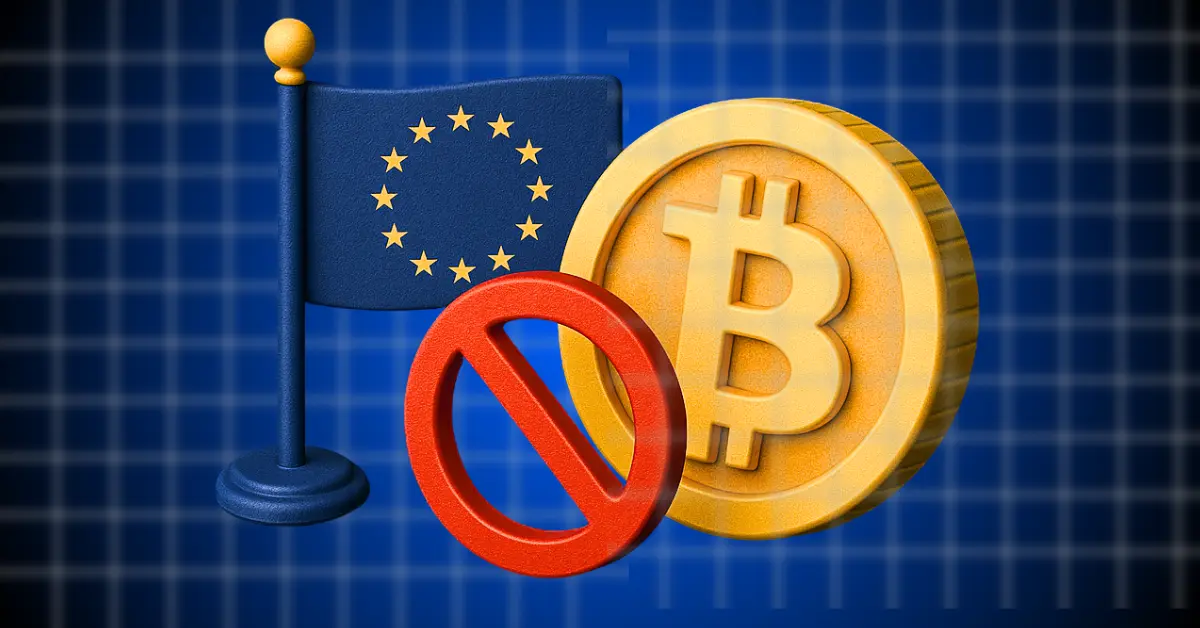
A major regulatory storm is brewing in Europe, and it could put Bitcoin users in legal jeopardy. A recent consultation by the European Data Protection Board (EDPB) could potentially ban Bitcoin across Europe, according to Alexandre Statchtchenko, co-founder of French crypto exchange Paymium.
The EDPB’s draft guidelines argue that Bitcoin public keys qualify as personal data, making every BTC transaction subject to GDPR (General Data Protection Regulation). Because a public key can indirectly identify a person, it triggers compliance obligations, including the right to data deletion—something fundamentally incompatible with blockchain’s immutability.
This clash between Bitcoin’s unalterable ledger and European privacy laws could make the cryptocurrency illegal to use or operate within EU nations.
The guidelines have sparked immediate backlash. Critics argue the EDPB is demanding a “radical solution” without offering a feasible technical pathway for data deletion on blockchain. The committee even admitted that deletion requires an “ad-hoc engineered architecture,” a solution that doesn’t currently exist for Bitcoin.
Statchtchenko highlights the absurdity of the situation, where regulatory demands conflict with each other. The GDPR requires anonymization and deletion of data, but Anti-Money Laundering (AML) and Know Your Customer (KYC) laws prohibit anonymity in financial transactions.
In France and other EU countries, anonymous crypto transactions are presumed to be money laundering, placing Bitcoin in a regulatory deadlock.
The EDPB’s public consultation is open until June 9, 2025, and it’s attracting attention from across the crypto and Web3 ecosystem. Major industry players and legal experts are expected to voice concerns before the final decision.If the current draft guidelines are adopted without change, Bitcoin could be effectively banned in Europe, leaving millions of users trapped in legal uncertainty.
he EU aims to balance innovation with consumer protection and regulatory compliance, leading to complex and sometimes conflicting stances, as seen with Bitcoin and GDPR.
In 2025, EU crypto regulation is primarily shaped by GDPR, which emphasizes data privacy, potentially conflicting with the nature of blockchain transactions.
MiCA (Markets in Crypto-Assets) is the EU’s comprehensive framework regulating crypto asset issuance and services, enhancing financial transparency and protecting investors.
AML/KYC laws demand identity verification, conflicting with GDPR’s call for anonymization and data deletion, creating a regulatory paradox for Bitcoin.
CoinPedia has been delivering accurate and timely cryptocurrency and blockchain updates since 2017. All content is created by our expert panel of analysts and journalists, following strict Editorial Guidelines based on E-E-A-T (Experience, Expertise, Authoritativeness, Trustworthiness). Every article is fact-checked against reputable sources to ensure accuracy, transparency, and reliability. Our review policy guarantees unbiased evaluations when recommending exchanges, platforms, or tools. We strive to provide timely updates about everything crypto & blockchain, right from startups to industry majors.
All opinions and insights shared represent the author's own views on current market conditions. Please do your own research before making investment decisions. Neither the writer nor the publication assumes responsibility for your financial choices.
Sponsored content and affiliate links may appear on our site. Advertisements are marked clearly, and our editorial content remains entirely independent from our ad partners.
Global asset manager VanEck has taken a pioneering step by filing an S-1 registration statement…
In a market where innovation and speed define success, a new crypto coin is stepping…
The rebrand from Zekret Protocol follows a $1M pre-seed round backing Entry’s push to combine…
As October begins, investors are looking at which coins could drive the next wave of…
Story Highlights The live price of the Tron coin is Tron crypto could reach a…
Story Highlights Binance Coin Price Today is . The BNB price prediction anticipates a potential…